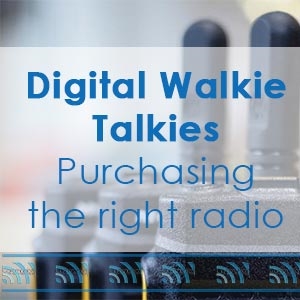

Understanding the difference in technology can be confusing at the best of times. Understanding 2 way radios can be even more confusing.
If you are new to using walkie talkies or you need to purchase radios for a new venture or occasion. Making sure you get the right radio for what you need is pretty essential and some simple things can be easily overlooked.
As we are in an age where smartphones are in everyone's hands and technology is an ever changing thing that impacts everything. 2 way radios have become just another commodity that is going digital.
Understanding digital 2 way radios and their benefits over analogue walkie talkies isn't so confusing. We always do our very best when dealing with customer enquiries, whether it's for a hire or sale to work out what it is you need.
Here's just a brief and small guide into digital walkie talkies.
Firstly.
Digital 2 way radios are on the whole more expensive than analogue.
As they are more expensive. If you're only going to use the radios 3/4 times a year for a couple of days or a week. Hiring walkie talkies could be more effective.
Will you need things such as Caller ID, to see who's radioing you or will you need Lone Worker. To activate an alarm in the event of a bad situation.
Digital radios often look very jazzy and sparkly with their LCD displays. LED colour changing indicators etc. But if you just want to use a radio to press a button, talk and receive. Will you need all that jazz?. Saving money and purchasing analogue radios could be the better option.
Whilst you can easily use analogue 2 way radios with radio repeaters. Digital can give you features such as GPS tracking, speed tracking, geo fencing and point to point calling. Is this something your infrastructure might need in future?. You can future proof your purchase by buying digital radios from the outset.
This isn't specific to digital walkie talkies but more a general observation.
If you plant to use your radios indoor or outdoor. Then the type of frequency that you need is something important to consider.
If you are in a bar, hotel, Leisure Centres for example. Having and using UHF radios indoor is the better choice. The UHF signal can penetrate walls, ceilings and floors a lot more effectively than VHF.
If you are an event organiser and plan music events or sporting occasions such as marathons or swims. Using VHF radios is what you need. The VHF signal carries further outdoor allowing better communication.
If you plan to do a mix of both. There is no safe option when picking the right frequency type for your new radios.
The tips above are just general observations and not a golden rule. Realistically if you were to use VHF indoor or UHF outdoor. Your equipment will still work but there is of course the chance of blackouts or issues arising.
There is no 'best radio' to buy when you are looking to purchase a new digital 2 way fundamentally the names of Motorola and Kenwood or Icom are of course the well known names. There are often alternatives that will work just as good.
Below are just 4 recommendations for Digital 2 way radios that have varying cost but fundamentally will do all the same thing.